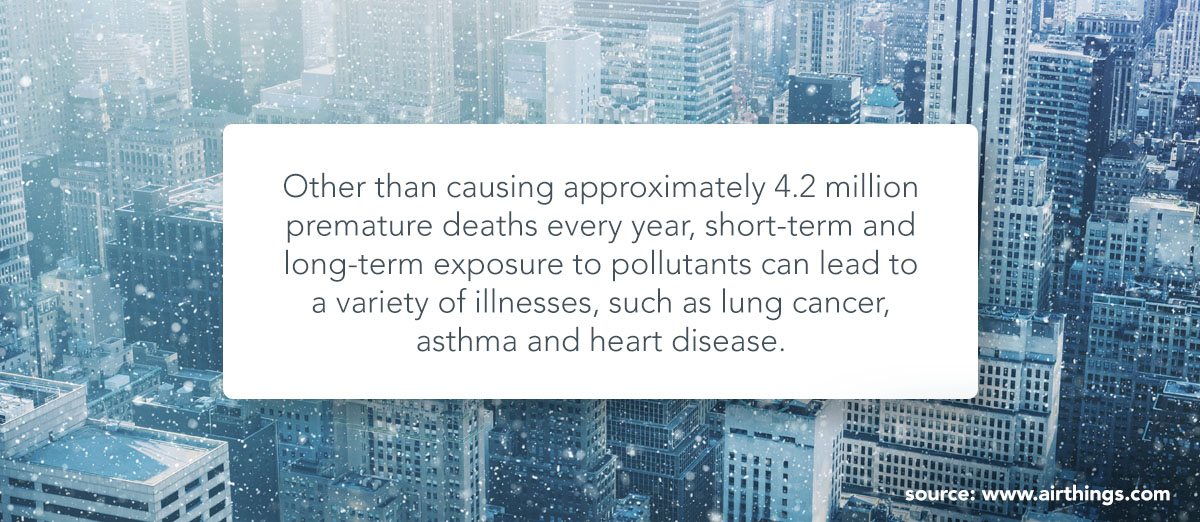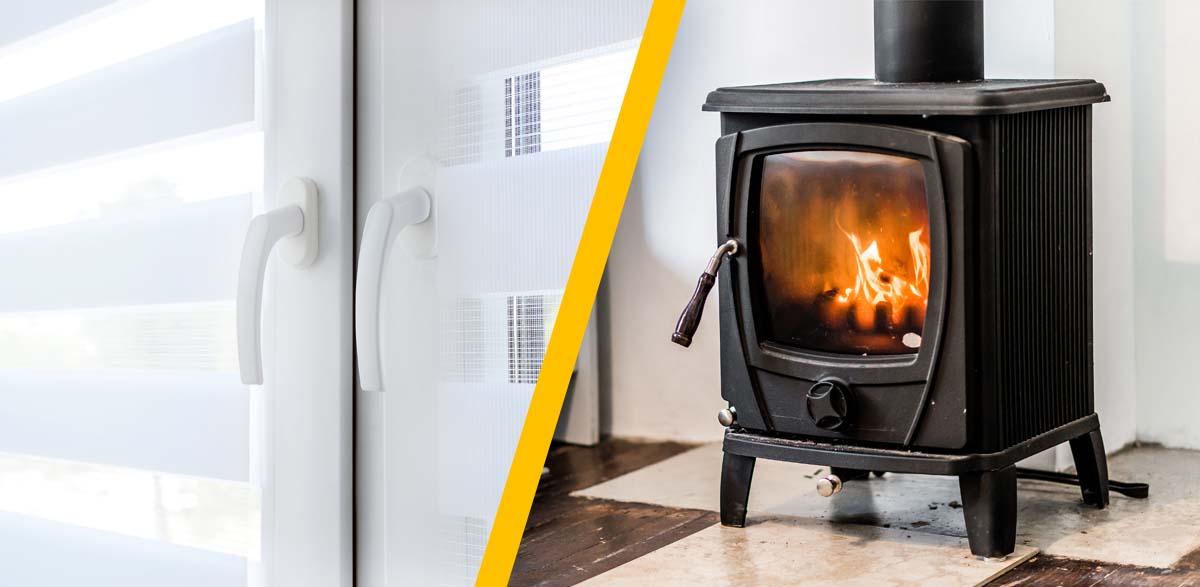A simple guide on how to handle air pollution in the colder months of the year.
It’s that time of the year. Winter brings crisp cold weather and holiday get-togethers—sadly, it also means increased air pollution.
Air pollution is an important health concern that everyone should be cautious of all year round, but it’s especially important to know how and why winter can put you at greater risk. This article provides the answers, and suggests the steps you can take to combat air pollution in winter.
In this blog:
- What is air pollution?
- How does air pollution impact our health and wellbeing?
- Why is air pollution worse in winter?
- What can you do to combat worse pollution in winter?
What is air pollution?
Air pollution is the presence of harmful substances (also known as ‘pollutants’) in the atmosphere. These substances have both natural and industrial origins, but if you live in a city, it’s very common for them to come from vehicles like cars, buses, and trucks.[1]
Generally, there are many types of pollutants that can be found in the air. According to the United States Environmental Protection Agency (EPA), these are the ones you should watch out for:[2]
- Particulate matter (PM)
- Carbon monoxide
- Lead
- Ground-level ozone
- Nitrogen dioxide
- Sulfur dioxide
Air pollution affects every country to some extent, but it’s an especially important issue in big cities where pollutant levels are at their most concentrated. In the United States, Los Angeles by far has the most contaminated air in the country when it comes to ozone.[3]
In the UK, Manchester, Liverpool and London have all exceeded the air pollution limits set by the World Health Organization (WHO).[4]
How does air pollution impact our health and wellbeing?
Air pollution has a serious impact on everyone’s health and wellbeing in many ways. Other than causing approximately 4.2 million premature deaths every year,[5] short-term and long-term exposure to pollutants can lead to a variety of illnesses, such as lung cancer,[6] asthma[7] and heart disease.[8] The most common culprit for these illnesses is PM, which is made of fine solid and liquid particles created by fuel combustion and vehicle traffic.[9]
What’s more, air pollution affects different age groups in specific ways—meaning it will pose health risks to you all throughout your lifetime. As adults, pollution can increase the likelihood of you having a stroke.[10] However, it can also have serious effects on children (who are at risk of slower lung development[11]) and elderly people. In fact, emerging research suggests that there may be a link between particulate matter and dementia.[12] This could make matters more concerning than we thought.
Why is air pollution worse in winter?
Seasonal conditions and habits can increase the level of air pollution. This is down to a number of key reasons:
Colder air traps more pollution
As you may already know, cold air usually sinks and warm air usually rises.
Most of the time, temperature decreases with elevation (how far up you are from the ground). This makes it easy for air near the surface of the earth (which contains a lot of pollution) to rise and be lifted away. However, during winter, thermal inversions are more likely to happen.[13] Because sunlight is weaker during this season, air near the earth’s surface may end up being cooler than the air above—causing the upper layer of air to act as a ‘lid’ and trap the colder, pollution-filled air below it. When you’re out and about in the city, you may see this in the form of winter smog.[14]
Overall, thermal inversions in winter can make air pollution more harmful to your health because it forces you to breathe in pollutants more often.
Drier air holds more pollution
Another reason why air pollution is worse in the winter is the fact that air is less humid. Cold air molecules naturally hold less moisture than warm air molecules, which means that the chances of rainfall are generally lower. This isn’t ideal because rain can wash away pollutants and stop thermal inversions from happening by mixing up layers of air.[15] Because air is drier in the winter, thunderstorms (which have the ability to break up ozone[16]) are also less frequent, making air pollution a bigger problem.
Winter habits can increase pollution levels
The way we behave during the winter usually contributes to higher levels of air pollution, which can make air quality worse. Indoors, we’re likely to use fireplaces and wood burners, which can triple the amount of PM in our homes.[17] What’s more, we tend to open windows less often when it’s cold outside in an effort to conserve heat. This can cause a lack of ventilation, which might make pollution levels more concentrated.
Outdoors, air pollution is made worse by an increase of fossil fuel combustion (due to higher energy usage during winter) and idling cars, which emit more pollutants.
What can you do to combat worse pollution in winter?
There are many simple ways to reduce air pollution and make it less harmful during the winter months. Other than doing your best to conserve energy whenever possible, you can avoid using wood as a source for heat and avoid leaving your car idling for longer than necessary. On top of this, you can improve your indoor air quality by ensuring good ventilation and opening windows every once in a while.
With Airthings View Plus, you can monitor PM levels and other air quality measures, receiving the alerts you need to take action and protect your home and loved ones against pollution.
Key takeaways
- Air pollution is the presence of any harmful substance in the air. One of the most harmful and common substances is particulate matter, which are made of liquid and solid particles from fuel combustion and road traffic.
- There are many health effects that are linked to air pollution, such as asthma, lung cancer and heart disease.
- Air pollution is worse in the winter because colder and drier air traps more pollution. Our habits during the winter months also contribute to increased pollution levels.
- Ensuring good ventilation and staying away from pollutants are effective ways to combat air pollution.










.webp)
